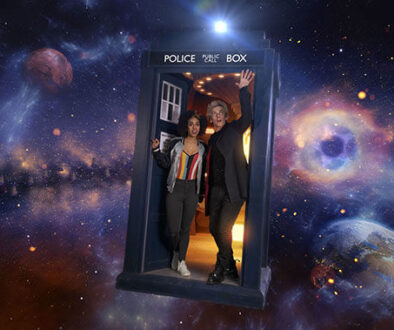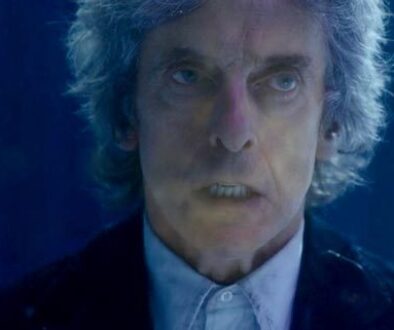Series 10: Empress of Mars Review
Clint Hassell gives his verdict on the ninth episode of Doctor Who Series 10.

Note: this review contains full spoilers for episode 9 of Series 10.
On the one hand, “Empress of Mars” feels like a classic episode of Doctor Who. Scripted by actor/comedian and long-time Whovian, Mark Gatiss, the story is a perfect example of the series’ “planets and history and stuff” mantra, first referenced in “Night Terrors” (also written by Gatiss). With the same rocky set pieces recycled into a budget-friendly maze of underground tunnels, and terror derived as much from the Ice Warriors now-iconic, guttural gurgle as from the stunningly effective latex makeup, the adventure feels like it could have starred Tom Baker. Heck, the episode even references imagery from “The Tomb of the Cybermen” and features the first appearance of recurring supporting character Alpha Centauri in the modern era, solely to explain the Ice Warriors presence in serials that aired 45 years ago! Further, “Empress of Mars” presents an interesting moral conundrum: for once, humans are the invading force, and are willing to plunder the Ice Warriors for their riches, their technology, and as cheap labor. Unable to convince the humans to leave Mars, the Doctor must decide how to protect the British soldiers against the unprecedented military force of the awakening Ice Warriors, while still maintaining his relationship with the otherwise innocent Martian natives.

On the other hand, beyond introducing a female Ice Warrior to the televised narrative, and explaining the Ice Warriors’ presence in Season 9’s The Curse of Peladon, “Empress of Mars” does little to expound on its “planets and history and stuff” premise. With a NASA set that crosses the boundary between “budget-friendly” and “low-rent,” and featuring a company of red-coated soldiers the script does little to differentiate, the adventure feels like it could have starred Colin Baker. Heck, the episode practically features a stock companion with Bill exhibiting none of the personality she displayed in earlier episodes. Further, “Empress of Mars” glosses over the interesting points it raises about gender, privilege, politics, and leadership in favor of an uninspired plot. Though it fails to deliver a wild sci-fi romp (“The Crimson Horror”) or effectively mine the dark, emotional aspects of its guest cast (“Night Terrors”), “Empress of Mars” succeeds over the inane “Robot of Sherwood” or the senseless “Sleep No More” as a perfectly acceptable, even enjoyable story to fill the latter half of Series 10.

And that’s my review: “capable, but unremarkable.” Three words to sum up the previous 467. However, I’m contracted for 1,500, so, rather than find 1,000 words to say “enjoyable, but nothing special,” let’s pull out the bold typeface and have an impromptu “questions, questions” discussion about some of the episode’s deeper points.

Was the outcome of the story guaranteed?
Had the Doctor been able to use the TARDIS, evacuating the British soldiers and escaping Mars would’ve been simple. However, that would’ve stranded the Ice Warriors with little technology to rebuild their civilization. They might never have made contact with Alpha Centauri, or begun the “Martian Golden Age” referenced by the Doctor. The future of an entire race seems like it would be a big deal, maybe even a fixed point in time, so, was the outcome of this episode guaranteed before the episode even started? More succinctly: did the ontological paradox established by the “God Save the Queen” message guarantee the story’s resolution? Perhaps the TARDIS removed itself from the narrative to ensure this event occurred? Or, perhaps . . .
Does the TARDIS hate Bill?
While we’ve seen evidence of the TARDIS’ sentience before, “Empress of Mars” presents the most blatant display of a self-piloting TARDIS, to date. The TARDIS is simultaneously aware of all of space and time and has “always [taken] you where you needed to go,” so, why was it necessary to separate Nardole from the group? The obvious answer is that, at the time “Empress of Mars” was written, Matt Lucas had not signed to reprise his role as Nardole for Series 10; it was easier to write him out of the episode, rather than fully incorporate another character into the story. However, within the narrative, why would the TARDIS separate Nardole from the Doctor and Bill? Nardole isn’t instrumental in negotiating peace between the British soldiers and the Ice Warriors, or even in rescuing the Doctor and Bill from Mars, as, ostensibly, the two could’ve hitched a ride with Alpha Centauri. No, the TARDIS seemingly took steps to ensure that Nardole felt forced to free Missy from the vault. Now, let’s say that Missy does something dastardly in the next couple of episode – – which, of course, she will – – that makes the TARDIS, and not Nardole, directly responsible for the outcome of her evil actions. If Missy kills Bill in “World Enough and Time,” does this mean that the TARDIS wants Bill dead?
Or, maybe the TARDIS just doesn’t like Nardole, and that’s why it’s been stubborn in the last two episodes?
The TARDIS didn’t like Amy, at first, or Clara.

Why is Nardole OK with their trip to NASA in the first place?
Throughout Series 10, Nardole has been the voice of reason, constantly reminding the Doctor of his solemn oath to guard the vault. Why is Nardole suddenly unconcerned that the Doctor remains earthbound? Further, for Nardole to sternly reprimand the Doctor for neglecting his duties, in “Oxygen,” only to be the one who frees Missy, in “Empress of Mars,” is incongruous. This is especially true since Nardole frees Missy merely because he can’t operate the TARDIS, despite being taught by River Song, whose skill surpassed even the Doctor’s.
So, would the story have worked better if Bill and Nardole were switched?
Consider: Bill turning to Missy for help makes more sense, as Bill does not know how to pilot the TARDIS. Further, Bill has ostensibly only met Missy once, and, while Missy did advocate killing Bill as a means to defeating the Monks, Bill’s willingness to follow orders, compared to Nardole’s ability to assert himself – – highlighted in “Empress of Mars,” as the two first remove their helmets to discover oxygen within the Martian tunnels – – makes Bill the more likely of the pair to be brainwashed by Missy’s guile.
Or, was Bill necessary to the story . . . because she’s a woman?
In the middle of a tense standoff between her Ice Warriors and the British soldiers, Iraxxa says to Bill, “We are both females, surrounded by noisy males. I would value your opinion.” Calling Bill’s sex to the audience’s attention, especially in a scene that examines the strength the Ice Queen derived from her diplomacy, is especially poignant. Companions are often singled out for their characteristics – – courageous, empathic, smart, moral, vocal – – but, explicitly defining someone by their sex seems politically incorrect, at best. And yet, series-long companions have all been female, save for Rory (who, honestly, was a package deal with Amy). Here, Gatiss makes Bill’s sex relevant, yet does so in a way that is not exploitive or insensitive – – a welcome revelation to a series that seems unwilling to explore such issues within its own casting.

Whose side was the Doctor on, anyway?
In the final act of “Empress of Mars,” the Doctor strives to prevent a war between the British military and the Ice Warriors – – a battle he is sure will end with the decimation of the Victorian soldiers – – by threatening to bury both armies under tons of ice and snow. Does the Doctor actually intend to follow through with his threat? If so, then he has already discounted the British soldiers as dead either way, and so is only trying to help the Ice Warriors. If he never intends to collapse the tunnel, and is using the ultimatum merely as a ruse to get Iraxxa to back down, then he is still clinging to the possibility of a peaceful resolution. Which is it? Bill states, “You knew that would happen,” and the Doctor replies, “Always been my problem – – thinking like a warrior,” hinting that the Doctor was always working towards the more positive prospect; however, “Into the Dalek” and “Mummy on the Orient Express” serve as evidence that either are possible for Twelve’s character.

And, finally, some silly, “serious” question about a seriously silly idea . . .
How do the Ice Warriors’ squareness guns wrist blasters work? One of the defining characteristics of classic-era Ice Warriors was their lack of resources; consequently, they used wrist blasters that fired concussive blasts of sonic force, or ear-piercing sonic grenades. While the idea of being crushed as you were folded into a fleshy cube is intimidatingly gruesome for the opposing army, a weapon like this would require a great expenditure of energy, compared to a projectile, like a bullet, or a blast of plasma. It doesn’t help that the associated special effect is comical, at best, downplaying the viciousness of the Ice Warriors, and making their new firearms into weapons only Wile E. Coyote could love. Was it really necessary to reinvent the Ice Warrior arsenal, especially at the expense of continuity?
You can read my analyses of several Mark Gatiss-penned episodes, here:
“Night Terrors,” “Cold War,” “Crimson Horror,” “Robot of Sherwood,” “Sleep No More”








